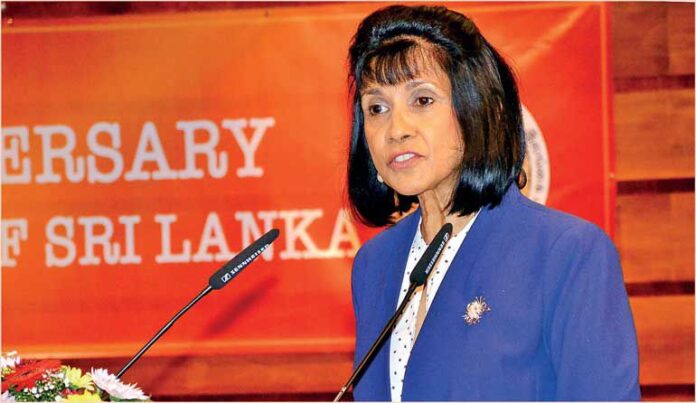Dr. Sharmini Coorey, Advisor to President Ranil Wickremesinghe and former IMF Director, delivered the 73rd Anniversary Oration of the Central Bank of Sri Lanka. In her address on “The Way Forward: Price Stability and Prosperity Need Good Governance,” she commended the Central Bank’s bold decisions to stabilize Sri Lanka’s economy post a severe crisis.
This is a summary of her speech.
Acknowledging the achievements, she highlighted the successful reduction of inflation from a peak of 74 percent to less than 2 percent in just a year. Coorey emphasized the importance of skilled leadership in navigating challenges, praising the synergy between effective monetary policies, supportive fiscal measures, and necessary reforms undertaken by the government to restore fiscal sustainability.
The ship of the national economy cannot swiftly change course, often blaming current corrective measures instead of past reckless policies. While progress has been made, the crisis persists, necessitating sustainable growth around 5-6% annually. Public sector contraction looms due to a high debt burden, requiring private sector-driven, export-oriented growth. Despite achieving low inflation, economic history warns against complacency. This time is different due to soaring debt ratios, increased poverty, and a brain drain of skilled professionals. The risk of debt distress is high, and another crisis would be disastrous for a vulnerable population. The imperative is to avoid short-term fiscal fixes and prioritize long-term, inclusive prosperity with a focus on sustained growth.
The way forward involves addressing poor governance as the root issue for sustained economic growth. Emphasising the importance of good governance, the focus should extend beyond economic policies to include the decision-making and implementation processes. The UNESCAP’s definition of governance involves accountability, transparency, adherence to the rule of law, responsiveness, effectiveness, and efficiency. Explicit attention to the governance process can improve resulting policies, even in challenging political contexts. Achieving good governance requires sustained social pressure and political will to counter vested interests. The speech outlines three crucial policy objectives: maintaining durable price stability through sound monetary policy, achieving fiscal sustainability through better taxation, and enabling market-oriented growth by reducing the size and role of the public sector. Thorough research and expert reports serve as the basis for addressing fiscal topics.
This passage addresses the significance of governance in achieving economic objectives. The Central Bank of Sri Lanka Act is highlighted as a crucial step toward good governance in monetary policy, emphasising transparency, independence, and accountability. The need to establish a culture of good governance is stressed, ensuring sound decision-making processes. Concerns are raised about the structure of the Monetary Policy Board, proposing a reduction in size for better accountability and avoiding potential political interference.
The focus then shifts to fiscal sustainability, emphasising the necessity of overcoming the reliance on external support and addressing underlying fiscal and governance issues. A call for better taxation practices is made, emphasising fairness, transparency, and efficiency. Specific proposals include passing an overarching tax law, sunsetting existing tax exemptions, abolishing certain acts, and enhancing transparency in quantifying tax expenditures.
Lastly, the importance of reducing the size and role of the public sector for market-oriented growth is discussed. Challenges in public procurement and state-owned enterprises are highlighted, urging the establishment of a public procurement law and addressing issues with unsolicited Private-Public Partnership proposals. Overall, the narrative underscores the need for comprehensive reforms and a commitment to good governance principles across monetary policy, taxation, and public sector management.
This section emphasises governance challenges in public procurement and state-owned enterprises (SOEs). Procurement irregularities, identified by the GDA and COPE, create corruption opportunities and hinder market competition. Recommendations include enacting a Public Procurement Law, transitioning to e-Government Procurement, empowering the National Procurement Commission, and enhancing transparency.
Concerns about the large SOE sector’s impact on competitive markets and public finances are raised. The National Transformation Road Map highlights monopolistic practices, inefficiencies, and financial burdens caused by SOEs. The urgency for fundamental SOE governance reform is stressed, aligning with the approved SOE Reform Policy that advocates divestment and commercial operation under a holding company.
The importance of an SOE Law is underscored, focusing on criteria for government stake retention, divesting commercially engaged SOEs, and ensuring political independence and competence in governing bodies. The need to avoid diluting reforms during parliamentary processes is emphasised.
In conclusion, the speaker addresses the crisis’s uniqueness, emphasising the narrow path forward due to high debt levels. Risks of political backsliding, resistance to reforms, and external shocks are acknowledged. Seventeen practical actions are proposed, spanning central bank independence, tax system improvement, public procurement governance, and SOE reform, to reinforce good governance and pave the way for inclusive prosperity amid challenges and opportunities.


